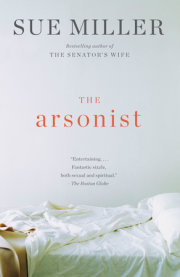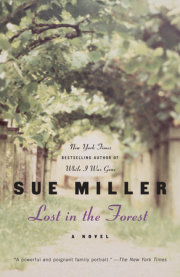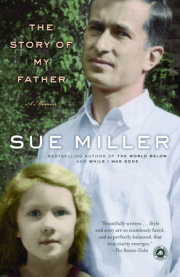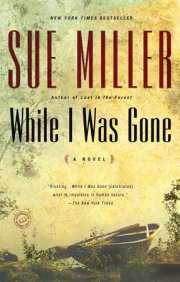One
Imagine it: a dry, cool day, the high-piled cumulus clouds moving slowly from northwest to southeast in the sky, their shadows following them across the hay fields yet to be cut for the last time this year. Down a narrow dirt road between the fields, a horse-drawn carriage, two old people wearing their worn Sunday clothes seated side by side in it, driving to town for their grown daughter's funeral. Neither of them spoke, though you could see, if you cared to look, that the old woman's lips were moving ceaselessly, silently repeating the same few phrases over and over. It was her intention, formed over the long weeks her daughter lay dying, to rescue her grandchildren from their situation, from their motherless house. To take all three of them back to the farm with her. She was rehearsing what she'd say, though she wasn't aware of her mouth forming the words, and her husband didn't notice.
Imagine this too: later in the afternoon of the same long day, the two older grandchildren, the girls, laughing together. Laughing cruelly at the old woman, their grandmother, for her misguided idea.
But perhaps it wasn't truly cruel. They were children, after all. As thoughtless as children usually are. What's more, they'd spent a good part of this strange day, the day of their mother's burial, laughing. Laughing nervously, perhaps with even a touch of hysteria, mostly because they didn't know what they ought to feel or think. Laughter was the easiest course. It was their way to ward off all the dark feelings waiting for them.
They'd been up before dawn, long before their father and little brother were awake, long before their grandparents started in to town, almost giddy with the number and variety of their chores. The meal after the church service was to be elaborate--deviled eggs, ham, scalloped potatoes, rolls, three kinds of jellied salad, pudding, and butter cookies--and they each had a list of things to do connected with it. They worked in the kitchen in their nightgowns, barefoot, as the soft gray light slowly filled the room. When the housekeeper, Mrs. Beston, arrived, she chased them upstairs to get dressed.
They had ironed their own dresses the day before because Mrs. Beston was so busy. They hung now on hangers from the hook behind their bedroom door, smelling of starch, smelling just slightly still of the heat of the iron--that sweet, scorchy odor. As they pulled them on over their heads and then helped each other plait their long braids, they were convulsed, again and again, by lurches of laughter that felt as uncontrollable as sneezing. Sometimes it was wild, almost mean. It fed on itself. Just looking at each other, or at their sleepy little brother, Freddie, who'd come in in his nightshirt, his hair poking up strangely, to sit on their bed and watch them, could set it off.
Maybe this explained it then--why, later in the day, when their father told them of their grandmother's notion, they couldn't stop themselves: why they gave way again to the same ragged hysteria. They laughed at her. They laughed at her and their grandfather's having clopped into town with horse and buggy; their father had had a motorcar forever, it seemed to them (it had been seven years). They laughed because she had only eight teeth left in her head and therefore smiled with her hand lifted to cover her mouth--they could both imitate this awkward, apologetic gesture perfectly. They laughed because she wore a ridiculous straw hat shaped like a soggy pancake, and an old-fashioned dress, the same old-fashioned dress she wore to all ceremonial events. They laughed because she had thought their father would so easily give them away.
"They are still children," is what the old woman said to her son-in-law. "They need a childhood." The two of them had gone together into the parlor after they greeted each other, and when she told him it was private, what she had to say to him, he shut the sliding pocket doors. It had been such a long time since anyone had pulled them out that a thick gray stripe of dust evenly furred all their decorative molding.
They sat not really looking at each other, the new widower and the dead woman's mother, and the grandmother forced herself to keep talking, to try to explain her plan to him. She wasn't a good talker, even in the easiest circumstances, and none of this was easy, of course. She hadn't imagined very much beyond her first statement ahead of time either. It was really her entire argument.
What's more, her son-in-law had always made her shy. He was a large, almost handsome man with slicked-down hair, getting burly now as he approached forty-five. He was a salesman, of vulcanized rubber goods, and his way of dealing with the world came directly from that life: he wanted to amuse you, to charm you. When he was courting her daughter--Fanny, her name was--he had flirted with the grandmother, and this had made her tongue-tied and silent around him. Once, after she'd served him a blueberry cake he found especially delicious, he'd grabbed her and waltzed her around the scrubbed wooden floors of her farmhouse kitchen. This had so unnerved her--his energy and strength, and her helplessness against them--that she'd burst into shameful tears.
That's what she felt like doing now, weeping, she was making such a mess of getting this said. It had seemed so clear to her as she moved through her solitary days while her daughter was dying and then since. The children needed her. They couldn't be left alone through the week any longer. The girls couldn't be asked to be so responsible--taking care of themselves and then their little brother too. It was too much. It was simply too much. They needed a home: someone to take care of them. She would offer to bring them to town on Fridays to be with him for the weekend. Or he could come out and stay with them on the farm. Oh, they'd be happy to have him!
All this planning had kept the image of her daughter--wasted, curled on her side, rising to consciousness only to cry out in pain--from her mind; though she'd spoken to Fanny often, another version of Fanny, as she'd made her preparations: as she'd shaken out the extra bedding, as she'd set out the framed pictures of her in the unused rooms she'd made up for the children. "Oh my dear girl," she had whispered. "They will be fine, you'll see. They just need someone to tend to them for a change, that's all, and I am the one to do it."
Her son-in-law waited a moment now, out of kindness and sorrow, before he answered. Then he cleared his throat and said that he saw things somewhat differently. His older daughter was almost sixteen, the younger thirteen--not really children at all. They were big, good girls. He needed their help, he said.
Of course, this was exactly her point. She didn't press it, though. She sat silently and nodded, just once, furious at herself. She was giving up. This easily.
And they were, he continued gently (very gently: he was fond of his mother-in-law, this cadaverously skinny and stern old woman), his children, after all.
She stood up and turned away from him, but not before he saw her mouth pull down, grim and defeated.
It had taken Fanny several years to die, of cancer, though no one had ever spoken the word in the house or in front of the children. And the truth was, as the grandmother would have admitted if she weren't wild with a grief that turned in like self-blame, that Fanny had been so unusual a young and then a nearly middle-aged woman that the girls had been in charge of the household long before anyone had guessed she was ill. So much for needing a childhood.
The girls were named Georgia and Ada. Georgia, the older, could remember even in the years when her mother was well, coming home from school for lunch, a privilege of the town children, to find the house silent, Fanny still in her housecoat, lying on the sofa in the parlor reading, just as she had been when Georgia left. She'd look up, surprised and dizzy. Her face was round and full, with fat, childish lips and a baby's startled blue eyes: a pretty, oddly unformed-looking young woman. "Why, Georgia," she'd say, day after day. "How can you be back so soon?" And then she'd rise and ineffectually pat at her hair or her robe. Often she was barefoot, even in winter. "Well, we'd better go see what we can scratch up for you girls to eat, hadn't we?"
It was a disgrace, really, though the children didn't care; they'd gotten used to it long before. In the kitchen, the breakfast dishes were still on the table, the grease congealed, the skin of the syrup pools lightly puckering with the unseen motion of the air. Upstairs, the beds would gape, unmade. When the baby, Freddie, came, Georgia's first task at noon would often be to take him up to the nursery to change his drooping diaper. "Oh, you pooper," she would say. "You big flop maker. Look what you've done now, you wicked boy." She would keep a steady stream of this insulting talk flowing, so that he would lie still in fascination and amusement and make her job easier, but also so that she wouldn't gag--she never got used to the piercing scent of ammonia, and worse, that she released each time she unpinned his sagging, weighted cloths.
Copyright © 2001 by Sue Miller. All rights reserved. No part of this excerpt may be reproduced or reprinted without permission in writing from the publisher.










